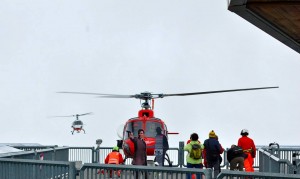
In June I traveled to Switzerland with my family. While I was there, I had two unique, unexpected experiences. First, my family visited the James Bond themed mountaintop installation called the Schilthorn. While we were eating lunch in the rotating restaurant, the cable car that is the only way up to and off of the mountain in this season broke. We were stranded for a couple of hours, until we made our exit in a Bond-worthy way: airlifted my helicopter to safety. My family likes adventures, so instead of being upset, we were kind of thrilled. I now know what it’s like to be pelted with gravel and snow as a helicopter lands, or the surprising smoothness of helicopter flight.
A week later I had the less pleasant, but no less exciting experience of spending a couple of hours in a Swiss ER. In the end, everything turned out fine, but I was having some trouble with my right eye that lead to my receiving a neurological exam in a mix of French and English and a CT scan of my brain. As I was being wheeled through the halls on a gurney, one of the thoughts that kept me from completely freaking out was “Someday, I’ll work this into a story.”
As writers we are in the unique position to not only live our experiences, but then to interpret and share them as art. Whether we are writing memoir, nonfiction, poetry, or even making things up, our own lives inform our work both consciously and unconsciously. As a fiction writer, I need to build a world that my readers can believe in, and that requires a mixture of imagination and details drawn from life. I could have imagined about a character climbing into a helicopter or receiving a brain scan, but the scene would have been thin. Now I can describe how the dye for the scan filled my mouth with a metallic taste. I know what thoughts might go through a character’s mind.
I’ve been thinking a lot about research recently. I’ll be writing my thesis in the fall, a collection of linked stories about a captive tiger, so I’ve been trying to gather as much information about tigers as I can. In addition, one member of my writing group is working on a novel set in medieval China, and another is working on a novel set in turn-of-the-century Russia. We’re all three grappling with the best ways to research. I plan to write more about that soon.
What I realized in thinking about my experiences in June is that there are two types of research. There’s the research you seek out, and then there’s the research that happens to you. The things that happen to us affect our writing, whether we like it or not. We can choose to try to ignore them, or we can use writing as a way to reflect on and come to terms with our experiences, even if it’s just through populating fictional worlds with real life details. Hemingway is a great example of a fiction writer who used his personal experience to enrich his fictional narratives. Many of his novels are centered around experiences similar to his own: visiting the festival of San Fermines in Pamplona, ambulance driving in World War I, fishing in the Caribbean. His fictional worlds are full of sights, sounds, scents and tastes that he no doubt experienced in person.
I don’t know if I’ll be writing a story about a family trapped on top of a mountain and rescued via helicopter anytime soon. I’m learning not to try to dictate my own direction, but to follow the ideas that call to me. However, there’s no doubt that during my trip I expanded my experience base. Who knows, maybe one of my characters will have a mysterious medical complaint that necessitates a CT scan. Or perhaps I’ll write about a journalist who must travel by helicopter. What I do know is that when one of these moments does come up, I’ll be able to render it more completely for having lived through it.
Miriam Cook, Ivan Gold Fiction Fellow

